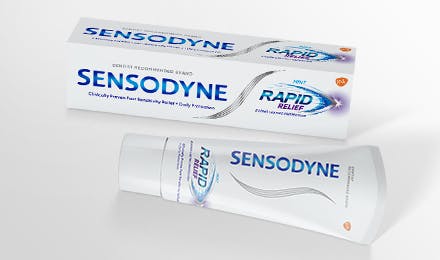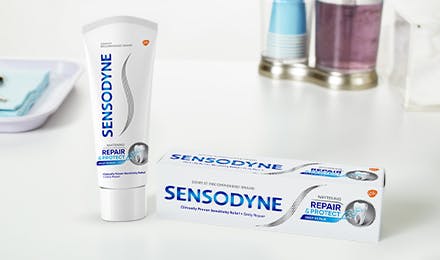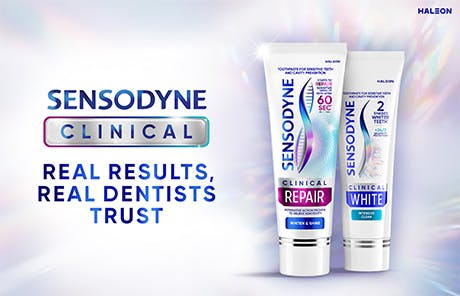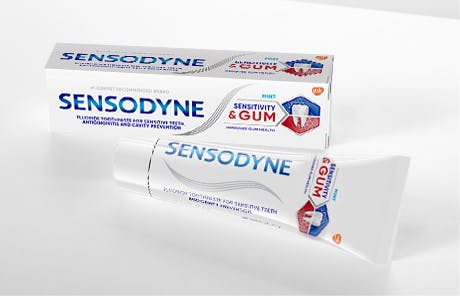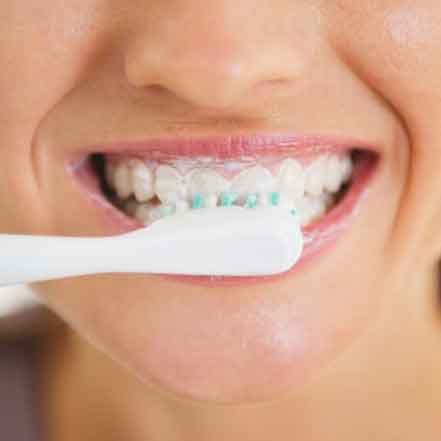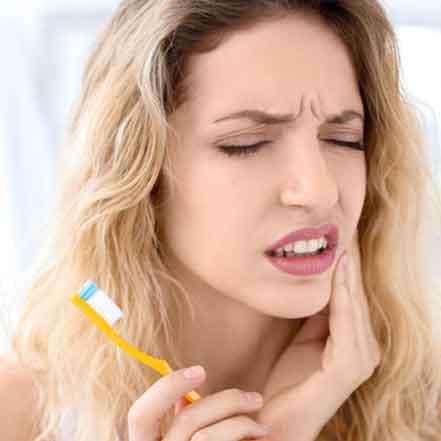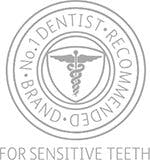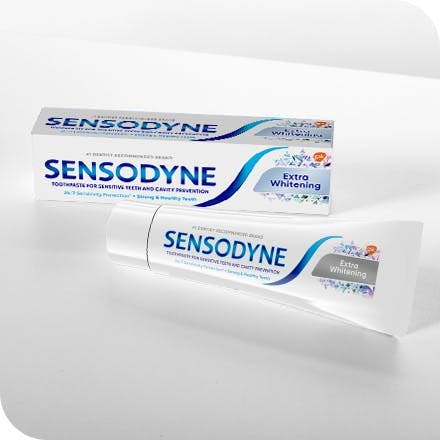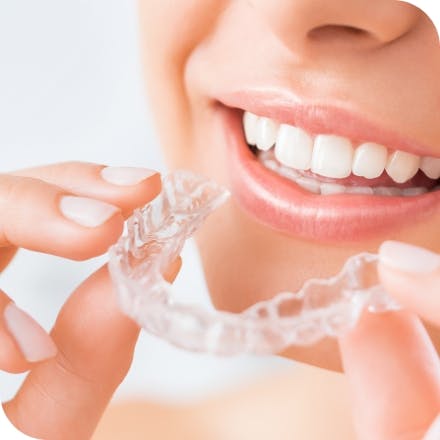How to Help Sensitive Teeth After Whitening
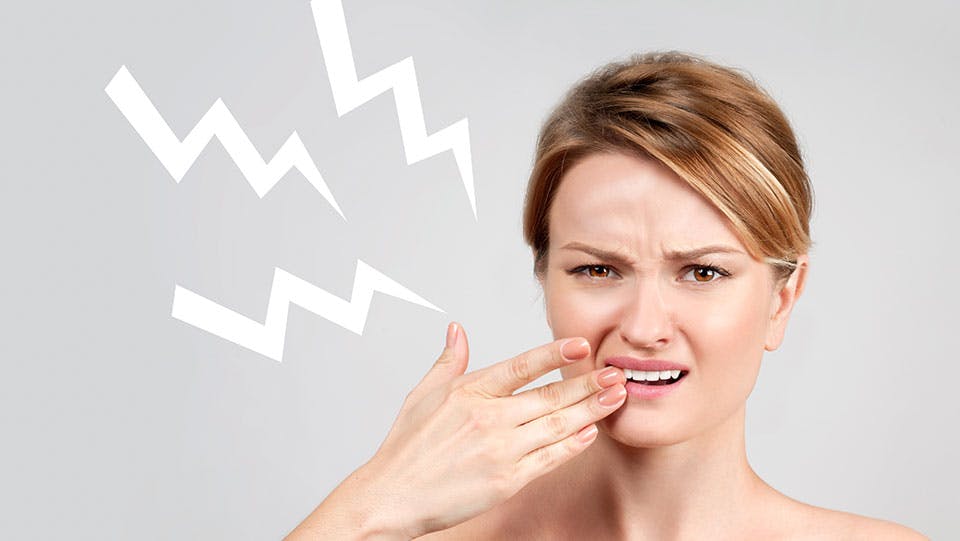
Everyone wants a beautiful smile, so you may consider teeth whitening products or even visiting your dentist for professional whitening treatments. But some products may cause sensitive teeth after whitening. In fact, over-the-counter teeth whitening kits commonly cause temporary tooth sensitivity.1 This sensitivity may occur during your treatment or when consuming hot or cold beverages. Learn why teeth whitening treatments can cause temporary sensitivity and how to manage it.
Key Takeaways
- Tooth sensitivity after a whitening treatment is common and usually temporary—it’s often caused by peroxide penetrating the dentin and irritating the tooth’s nerve center.1
- Preventative care matters. Use a sensitive teeth whitening toothpaste and consult your dentist before starting any home or professional whitening treatment.
- Simple changes like using a soft-bristled toothbrush, using a gentle toothpaste and avoiding cold drinks can make a big difference in comfort after a whitening treatment.5,7,9
What Causes Sensitive Teeth After a Whitening Treatment?
Many people seek out teeth whitening treatments due to staining or discoloration. This discoloration can occur from drinking coffee, tea, or wine or from smoking cigarettes. Some medications may even cause discoloration.1 But both over-the-counter whitening treatments and professional treatments may cause sensitivity. Research has indicated other risks due to whitening treatments, like the softening of the tooth surface and increased potential for demineralization.4
Consider the structure of teeth. Teeth have three layers:2
- Enamel – The tooth’s outermost layer composed of hard, calcified tissue. Because it contains no living cells and requires professional care from a dentist if worn away or decaying.
- Dentin – Middle layer, located under the enamel and contains microscopic tubules. When the enamel becomes compromised, these tubules become exposed and allow various sensations to stimulate the nerves within the tooth, causing sensitivity.
- Pulp – Center layer of the tooth that contains nerves, blood vessels and connective tissue. The pulp of the tooth is soft, sensitive tissue.
When whitening treatments cause sensitivity, it is often due to hydrogen peroxide or carbamide peroxide, the main bleaching agent in the treatment.3 Higher concentrations of bleaching agents like carbamide and hydrogen peroxide have been shown to cause greater sensitivity.1,3 Fortunately, this sensitivity is temporary, especially once you discontinue use of the treatment.1
If home whitening treatments are causing tooth sensitivity, you should stop treatment and contact your dental professional.1,3,4
Gingival Sensitivity After Whitening
If you’re experiencing mouth irritation or gum pain after using an at-home whitening kit, it may have to do with your gums rather than your teeth. At-home teeth whitening kits frequently come with gel trays that may cause irritation to the gums if the trays do not fit properly or the treatment is not correctly applied.1,3
What Does Tooth Sensitivity Feel Like After Whitening?
If you’ve never experienced sensitive teeth after whitening before, you may not be sure what the sensation means. Sensitivity usually manifests as sharp, temporary pain while brushing or eating or drinking foods that are either hot or cold.5 Talk to your dentist about what to expect when getting your teeth whitened.
Best Ways to Treat Sensitive Teeth After Whitening?
There are a few tips and tricks that may help alleviate some sensitivity after a whitening procedure. However, it’s important to talk to your dentist or dental hygienist about teeth sensitivity and any new products or treatments you’re interested in trying before you take them to manage sensitivity.
Try a desensitizing toothpaste
If you have tooth sensitivity before you start a whitening treatment, it is recommended to use a desensitizing toothpaste two weeks prior to your at-home whitening treatment, as well as continued use during and after whitening treatment.5 Talk to your dentist about using a desensitizing toothpaste to help relieve sensitivity after whitening.6 Consider a toothpaste like Sensodyne Clinical White. Sensodyne Clinical White is gentle on teeth. It does not contain hydrogen peroxide that may trigger sensitivity. When you use Sensodyne Clinical White, you’ll get 24/7 sensitivity protection.** You’ll also notice whiter teeth after 2 weeks.‡
Switch to a soft-bristled toothbrush
Whether or not you’ve just had a whitening treatment, using a soft-bristled toothbrush is your best bet when it comes to brushing your teeth.7 Brushing with a toothbrush with firmer bristles—especially if you’re brushing too vigorously—can lead to further damage to your gums and tooth enamel.7
Drink with a straw
If you have sensitive teeth, try drinking cold or hot beverages through a straw.10 This prevents drinks from coming in contact with your teeth.11
How Do You Prevent Sensitive Teeth During Whitening Treatments?
In addition to considering the above tips for helping your sensitive teeth after whitening, you can take some steps to prevent some of the sensitivity before you whiten your teeth.
Ask your dentist about using a teeth whitening product with a lower concentration of hydrogen peroxide for in-office treatments. One clinical trial showed that a professional whitening using a solution that contained 35% hydrogen peroxide caused tooth sensitivity in all cases, even on people who did not have sensitive teeth otherwise.4
Speak with your dental professional about helping to reduce sensitivity with potassium nitrate and fluoride toothpaste.6
If you have sensitivity, use Sensodyne Clinical White toothpaste for two weeks before, during, and after your whitening treatment to help care for sensitive teeth. It’s gentle enough for everyday use and provides 24/7 sensitivity protection. Twice daily brushing with Sensodyne Clinical White Stain Protector toothpaste provides longer lasting whitening after a whitening treatment*and does not contain hydrogen peroxide that may trigger sensitivity. Get whiter, brighter teeth with Sensodyne Clinical White toothpaste.^
*vs. a non-whitening toothpaste with continued twice daily brushing after a 7 day at home treatment of 15% peroxide
^after 8 weeks twice daily brushing
**with twice daily brushing
‡ *vs a non-whitening tothpaste with twice daily brushing
Source Citations:
- Oral Health Topics: Whitening. ADA. https://www.mouthhealthy.org/all-topics-a-z/teeth-whitening. https://www.ada.org/en/member-center/oral-health-topics/whitening. Accessed 5/8/2025.
- Tooth. ADA. https://www.mouthhealthy.org/all-topics-a-z/tooth. Accessed 5/8/2025.
- Effectiveness and Adverse Effects of Over-the-Counter Whitening Products on Dental Tissues. Department of Restorative Dentistry. https://doi.org/10.3389/fdmed.2021.687507. Accessed 5/8/2025.
- Tooth Whitening: What We Now Know. Journal of Evidence Based Dental Practice. https://pmc.ncbi.nlm.nih.gov/articles/PMC4058574/. Accessed 5/8/2025.
- Sensitive Teeth: Causes and treatment. JADA. https://jada.ada.org/action/showPdf?pii=S0002-8177%2814%2965480-5https://www.mouthhealthy.org/all-topics-a-z/sensitive-teeth. Accessed 5/8/2025.
- Tray delivery of potassium nitrate-fluoride to reduce bleaching sensitivity. National Library of Medicine. https://pubmed.ncbi.nlm.nih.gov/12066670/. Accessed 5/8/2025.
- 10 Things You Didn’t Know About Your Toothbrush. MouthHealthy. https://www.mouthhealthy.org/en/az-topics/t/toothbrushes. Accessed 5/8/2025.
- A videofluoroscopic comparison of straw and cup drinking: the potential influence on dental erosion. British Dental School. https://www.nature.com/articles/4809782. Accessed 5/8/2025.
- What causes sensitive teeth, and how can I treat them? Mayo Clinic. https://www.mayoclinic.org/healthy-lifestyle/adult-health/expert-answers/sensitive-teeth/faq-20057854. Accessed 7/15/2025.
- Tips to reduce tooth pain caused by sensitivity. American Dental Association. https://adanews.ada.org/huddles/tips-to-reduce-tooth-pain-caused-by-sensitivity/. Accessed 7/15/2025. use
- Dental experts share the devilish drinks that will impact your mouth. Oral Health Foundation. https://www.dentalhealth.org/news/dental-experts-share-the-devilish-drinks-that-will-impact-your-mouth. Accessed 7/15/2025.


